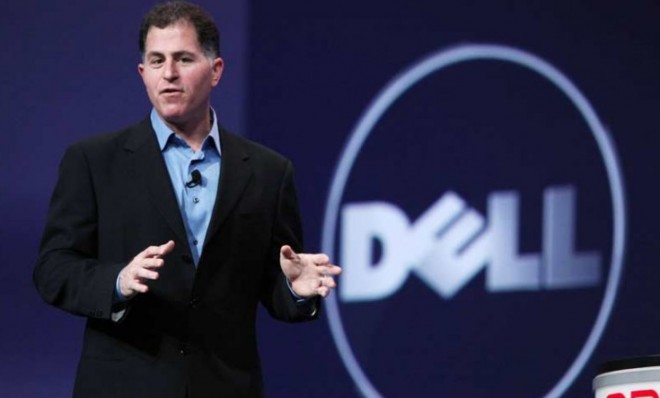Dell goes private in $24 billion deal: Smart move?
The struggling computer maker hopes to rebuild in the age of the smartphone


A free daily email with the biggest news stories of the day – and the best features from TheWeek.com
You are now subscribed
Your newsletter sign-up was successful
Dell announced on Tuesday that it would go private in a $24 billion deal, the company's most drastic step yet to maintain relevance in a tech market increasingly dominated by smartphones and tablets. The deal was orchestrated by a group of investors — including founder Michael Dell, private-equity fund Silver Lake, and software giant Microsoft — and was facilitated by loans from a handful of big banks.
The point of taking Dell private is to create some elbow room for Michael Dell to turn the company around without the intense scrutiny of shareholders. At the moment, the company's flagging PC business is still a top revenue generator, and Dell also runs a technology and services business for companies. The idea is to move away from PCs and focus on services, much the way IBM did to great success — the difference being that IBM did so years ago.
Plenty of skeptics are predicting a rough road ahead for Dell. As Ashlee Vance at Bloomberg writes:
The Week
Escape your echo chamber. Get the facts behind the news, plus analysis from multiple perspectives.

Sign up for The Week's Free Newsletters
From our morning news briefing to a weekly Good News Newsletter, get the best of The Week delivered directly to your inbox.
From our morning news briefing to a weekly Good News Newsletter, get the best of The Week delivered directly to your inbox.
While this strategy may be sound, it takes a long time to execute and certainly does not look revolutionary. Dell basically bought the IBM business plan and did some minor alterations. Michael Dell may be one of the wealthiest and most successful people this country has ever created, but such accomplishments must do little to soothe the ego as people ask again and again and again why the company has seemed so darn inept in areas like smartphones and tablets and…well, anything interesting. [Bloomberg]
Indeed, Dell's inability to produce exciting products has been a real drag for the company. According to Kevin Roose at New York:
Dell is not an intrinsically interesting company — its PCs are cheap, unremarkable, and not the kind of thing you stand in line on release day to buy. It doesn't have enticing ads featuring Zooey Deschanel, and many of its customers are huge corporations. Articles about the company contain snooze-worthy sentences like: "Emphasizing data-center products and services has helped Dell stave off margin erosion." [New York]
Dell's harshest critic, however, was rival Hewlett-Packard, which said it would be more than happy to pick up customers who will allegedly be left by the wayside as Dell tries to effect a turnaround:
Dell has a very tough road ahead. The company faces an extended period of uncertainty and transition that will not be good for its customers. And with a significant debt load, Dell's ability to invest in new products and services will be extremely limited. Leveraged buyouts tend to leave existing customers and innovation at the curb. We believe Dell's customers will now be eager to explore alternatives, and HP plans to take full advantage of that opportunity. [Business Insider]
Burn. Though, in all fairness, it should be noted that H-P is suffering from the same problems and is hardly a model of financial coherence at the moment.
Two related items: The deal to take Dell private is the largest leveraged buyout since 2007, which some analysts are already trumpeting as evidence that the market has finally revived its appetite for the type of massive takeovers that occurred with regularity before the Great Recession. Others aren't so sure. "This deal, for example, was aided by the investment by Microsoft," says The Wall Street Journal, "help not every buyout firm can regularly tap." Microsoft's investment is the other interesting factor. Analysts say the software giant is concerned that trouble for Dell could lead to reduced sales of Microsoft's Windows operating system. Microsoft's future role at Dell remains unclear, though some are speculating that it could guide Dell toward new, interesting Windows-loaded products.
A free daily email with the biggest news stories of the day – and the best features from TheWeek.com
Ryu Spaeth is deputy editor at TheWeek.com. Follow him on Twitter.
-
 ‘Those rights don’t exist to protect criminals’
‘Those rights don’t exist to protect criminals’Instant Opinion Opinion, comment and editorials of the day
-
 Key Bangladesh election returns old guard to power
Key Bangladesh election returns old guard to powerSpeed Read The Bangladesh Nationalist Party claimed a decisive victory
-
 Judge blocks Hegseth from punishing Kelly over video
Judge blocks Hegseth from punishing Kelly over videoSpeed Read Defense Secretary Pete Hegseth pushed for the senator to be demoted over a video in which he reminds military officials they should refuse illegal orders